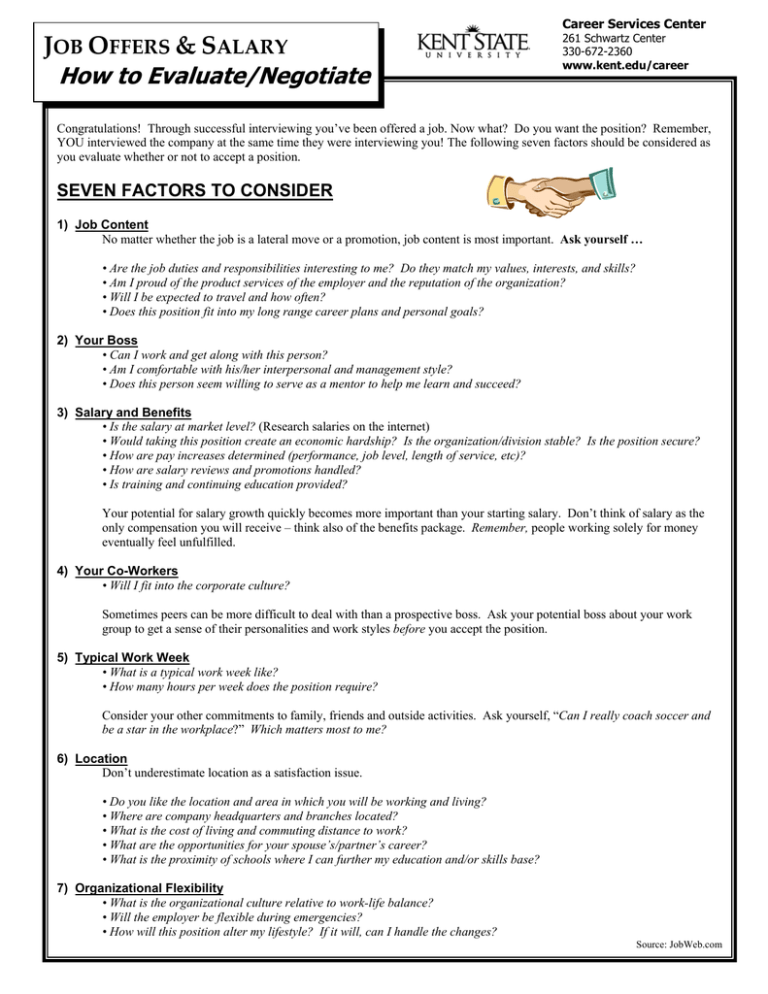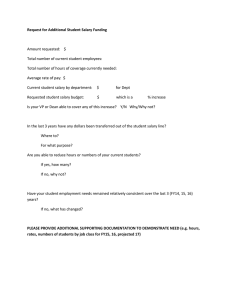J O & S
advertisement

Career Services Center JOB OFFERS & SALARY How to Evaluate/Negotiate 261 Schwartz Center 330-672-2360 www.kent.edu/career Congratulations! Through successful interviewing you’ve been offered a job. Now what? Do you want the position? Remember, YOU interviewed the company at the same time they were interviewing you! The following seven factors should be considered as you evaluate whether or not to accept a position. SEVEN FACTORS TO CONSIDER 1) Job Content No matter whether the job is a lateral move or a promotion, job content is most important. Ask yourself … • Are the job duties and responsibilities interesting to me? Do they match my values, interests, and skills? • Am I proud of the product services of the employer and the reputation of the organization? • Will I be expected to travel and how often? • Does this position fit into my long range career plans and personal goals? 2) Your Boss • Can I work and get along with this person? • Am I comfortable with his/her interpersonal and management style? • Does this person seem willing to serve as a mentor to help me learn and succeed? 3) Salary and Benefits • Is the salary at market level? (Research salaries on the internet) • Would taking this position create an economic hardship? Is the organization/division stable? Is the position secure? • How are pay increases determined (performance, job level, length of service, etc)? • How are salary reviews and promotions handled? • Is training and continuing education provided? Your potential for salary growth quickly becomes more important than your starting salary. Don’t think of salary as the only compensation you will receive – think also of the benefits package. Remember, people working solely for money eventually feel unfulfilled. 4) Your Co-Workers • Will I fit into the corporate culture? Sometimes peers can be more difficult to deal with than a prospective boss. Ask your potential boss about your work group to get a sense of their personalities and work styles before you accept the position. 5) Typical Work Week • What is a typical work week like? • How many hours per week does the position require? Consider your other commitments to family, friends and outside activities. Ask yourself, “Can I really coach soccer and be a star in the workplace?” Which matters most to me? 6) Location Don’t underestimate location as a satisfaction issue. • Do you like the location and area in which you will be working and living? • Where are company headquarters and branches located? • What is the cost of living and commuting distance to work? • What are the opportunities for your spouse’s/partner’s career? • What is the proximity of schools where I can further my education and/or skills base? 7) Organizational Flexibility • What is the organizational culture relative to work-life balance? • Will the employer be flexible during emergencies? • How will this position alter my lifestyle? If it will, can I handle the changes? Source: JobWeb.com Negotiating Salary Wait until after you have been offered the position before negotiating your salary. Discussing salary at the beginning of the first interview is premature, but waiting until after you accept the position reduces your negotiating power. If you are asked during the interview, “What are your salary requirements?” or “How much do you think you are worth?” … It is best not to offer any specific salary requirements, but instead, provide an answer such as, “I would prefer to review all aspects of this position before discussing salary.” or “May we revisit salary after you have a better picture of what I have to offer?” or “I’m looking for the maximum, fair compensation for the responsibilities involved.” or “What salary range do you have in mind?” Three Job Offer Options 1) Consider Job Offer And Follow Up Within Agreeable Time-frame - First and foremost, express appreciation for the offer. However, there is no reason to say yes to an offer immediately and most organizations will not expect you to accept an offer on the spot. Offer a reasonable amount of time to get back to the employer with your decision (preferably within the next few days, or time-frame agreeable to the employer). Try to take away a written offer, or at minimum, detailed notes. What to say: “I’m excited about the possibility of working here, but would like to take some time to think about your offer. Could I get back with you tomorrow with my decision?” 2) Accept Offer On The Spot - If the salary is acceptable, show your appreciation for the offer and accept! Ask the employer to confirm the offer in writing. Do not interview for any other positions. Never renege on an offer you have already accepted. What to say: “Thank you for your confidence in me. I look forward to working with you.” 3) Reject the Offer - Express your appreciation for the offer and for their confidence in you. Say something positive about the employer and thank them for the interview, then politely decline the offer. You never know when you may meet again! What to say: “While I appreciate the opportunity to have interviewed with your organization, I do not believe this position is a good match for me at this time.” A Strategy for Weighing Several Job Options The “weighted average” method below removes the subjective influence we often do not realize occurs when making decisions. Creating a chart with the values below is an easy method for prioritizing options. 1) List the job factors essential to your decision. 2) Use a 5-point scale and allocate points to each of these factors based on their level of importance to you (1=least important; 5 = most important) 3) Rank the essential factors for each job you are considering 4) Multiply your job factor point values (level of importance column) by the factor point values assigned to each job 5) Add the total up for each job. You now have your weighted factors to help you objectively make your job search decisions. Job Factor Job Content Job Location Salary Growth Prospects Matches my Qualifications Reputation of Company Convenient Work Hours Level of Importance 5 5 3 4 2 4 2 Job # 1 Level of Importance x Job #1 Rank 5 x 2 5 x 3 3 x 5 4 x 2 2 x 2 4 x 5 2 x 3 Total = = = = = = = = 10 15 15 8 4 20 6 78 Job # 2 Level of Importance x Job #2 Rank 5 x 3 5 x 1 3 x 3 4 x 4 2 x 5 4 x 3 2 x 3 Total = = = = = = = = 15 5 9 16 10 12 6 73 This method can also be used when making other important decisions in life such as choosing a major or graduate program. 5/10


